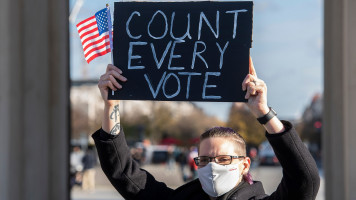'Election results will protect Lebanon,' says pro-Hizballah party leader
Lebanon's powerful Parliament Speaker Nabih Berri said on Tuesday that the country's general election results vindicated a formula in which both the army and Hizballah guarantee the country's protection.
Polls held on Sunday, the first in nine years, saw Hizballah and its allies garner enough seats in parliament to block any attempt by its political foes in parliament to make it disarm.
"The truth is that the results support the equation in Lebanon, we call it the golden equation: the army, the people, the resistance," Berri told AFP in an interview at his residence in south Lebanon.
Often described as Lebanon's shrewdest political player, 80-year-old Berri has held the position of speaker since 1992 and also heads the influential Shia movement, Amal.
According to provisional results for Sunday's vote, his party scored 16 seats out of parliament's 128, three more than its ally Hizballah.
Unlike Amal and all other factions, Hizballah did not give up its weapons when the Lebanese civil war ended in 1990 and its arsenal has now grown to rival the national army's.
The group's weapons cache is the most divisive issue in Lebanese politics, but Amal and other MPs allied to Hizballah should be in a position to fend off any challenge in parliament.
 |
Unlike Amal and all other factions, Hizballah did not give up its weapons when the Lebanese civil war ended in 1990 and its arsenal has now grown to rival the national army's |  |
Hizballah and its allies argue the army is too weak to defend the country from Israel. Its critics say Hizballah is the main reason Israel would attack Lebanon and should disarm if it wants to protect the country.
Amal's popularity among the Shia community - dominant in areas near Lebanon's southern border - grew when Israel invaded in 1982.
"We're a country that Israel has occupied, and it remains on our land... it still has ambitions for our water, oil, gas, land," he said.
A deadly conflict between Israel and Hizballah erupted in 2006 and fears of an even deadlier and more devastating war have cast an abiding gloom over Lebanon.
Voting system reform again
Hizballah was born of an Amal splinter and the groups were rivals during the civil war. Decades later, they find themselves politically aligned on most issues and have been repeatedly hailed as the winning "Shia duo" after Sunday's vote.
One of the election's striking features was a disappointing turnout of 49.2 percent, which Berri blamed on the electoral law passed last year and used for the first time on Sunday.
"We know it from France and other countries - that proportionality is the best electoral system but it isn't implemented in small electoral districts," he said.
"Lebanon as a whole could be a district in Europe," Berri said of his country, which has an electorate of around 3.7 million.
 |
The reformed electoral law introduced an element of proportionality to replace the previous, majoritarian system but its complexity and the opportunist alliances it generated appeared to put voters off |  |
He said he had initially supported the idea of a single nationwide district but that ensuing consultations yielded a complex map of 15 districts, all different in size and sectarian distribution.
"This took us away from the spirit of proportionality and made it so that the sectarian element has a bigger impact than the proportionality element," Berri said.
The reformed electoral law introduced an element of proportionality to replace the previous, majoritarian system but its complexity and the opportunist alliances it generated appeared to put voters off.
Berri said reforming the electoral law again should be one of the priorities of the new chamber.
"As soon as we have a legislative session, one of the first tasks we should start with would be developing this electoral law so that all parts of Lebanese society are content with it," he said.
Berri is widely expected to be handed a new mandate as speaker, although he refused to comment on the issue.
Lebanon's unique sectarian power-sharing arrangements provide for parliament to be split equally between Christians and Muslims and stipulate that the president be Maronite, the prime minister Sunni and the speaker Shia.





 Follow the Middle East's top stories in English at The New Arab on Google News
Follow the Middle East's top stories in English at The New Arab on Google News


![Algeciras port [Getty]](/sites/default/files/styles/image_330x185/public/75377010.jpeg?h=327453ef&itok=KfCFUEza)